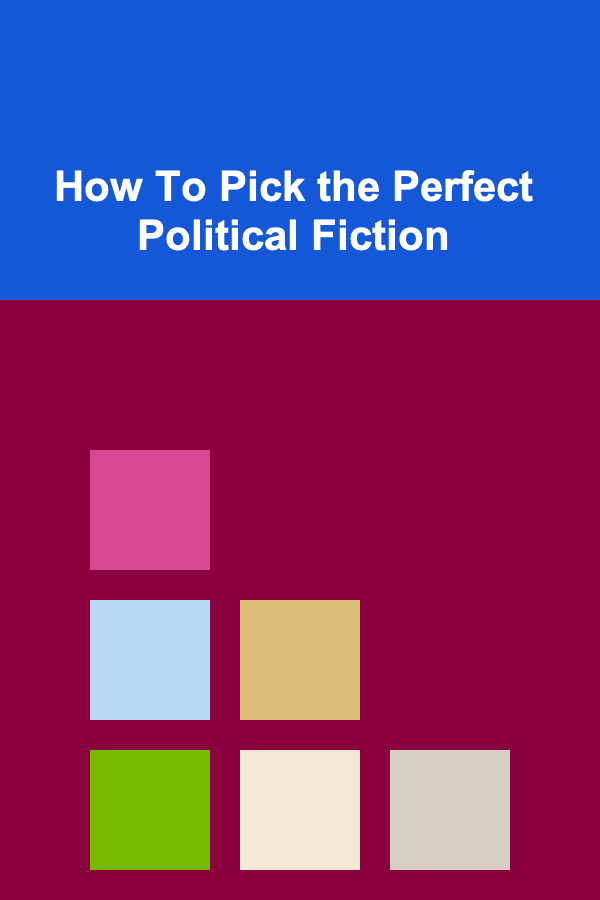
How To Pick the Perfect Political Fiction
ebook include PDF & Audio bundle (Micro Guide)
$12.99$8.99
Limited Time Offer! Order within the next:

Political fiction has long been a genre that captures the complexity of human nature within the constraints of governance, power dynamics, and societal ideals. From the allegories of ancient times to the sophisticated political narratives of the modern world, political fiction has evolved as a reflection of the shifting paradigms in both real-world politics and fictional storytelling. Picking the right political fiction, however, requires a careful understanding of both the personal preferences of the reader and the nuances that the genre presents.
Political fiction is not a monolithic category; it spans across different forms, from dystopian novels to historical retellings, speculative stories to direct critiques of contemporary political issues. The choice of the "perfect" political fiction involves navigating this landscape, understanding what political fiction offers, and matching a story's themes, characters, and narrative style to a reader's preferences.
In this article, we will explore the elements that make political fiction unique, the different subgenres within the category, and how to determine which work of political fiction is perfect for you.
Understanding Political Fiction
Before diving into the selection process, it's essential to first understand what political fiction entails. Political fiction uses the structure of storytelling to address political themes, often involving issues of power, control, revolution, injustice, and governance. The genre often critiques or satirizes political ideologies, systems, and the power structures that shape the lives of individuals.
While some political fiction draws heavily from real political history or current events, others offer speculative worlds that examine the consequences of unchecked power. The genre invites readers to reflect on how political forces influence everyday life and how those forces might evolve in the future. At its core, political fiction seeks to engage readers with more than just characters and plot---it challenges them to think critically about the systems that govern societies.
Political fiction is not confined to a particular narrative style or tone. Some novels are written as intense thrillers, while others adopt a more subtle, philosophical approach. Some authors employ satire to expose the absurdities of power, while others use grim realism to reflect on the darker side of politics. Understanding the variety of approaches within political fiction is key to selecting the right book.
The Subgenres of Political Fiction
Political fiction is a broad category with numerous subgenres that cater to different tastes and interests. When choosing the perfect political fiction, it's important to recognize which subgenre aligns with your interests.
1. Dystopian Fiction
Dystopian novels often present a vision of a future society in which political systems have gone awry, and individuals are oppressed, controlled, or manipulated by an authoritarian regime. These works explore the consequences of unchecked power and the fragility of freedom.
- Why Choose It: If you enjoy speculative worlds and dark, thought-provoking tales that question the direction of contemporary society, dystopian fiction offers a gripping narrative. These stories often serve as cautionary tales about the potential consequences of political decisions and ideologies gone wrong.
- Famous Works: 1984 by George Orwell, Brave New World by Aldous Huxley, The Handmaid's Tale by Margaret Atwood.
2. Historical Political Fiction
Historical political fiction sets its story in a real historical context, using actual political events, figures, and periods to tell its narrative. These novels may explore the lives of politicians, movements, or revolutions, often blending factual events with fictional characters and storylines.
- Why Choose It: If you're interested in history and want a novel that gives insight into real-world political struggles, this subgenre is perfect for you. Historical political fiction brings the past to life in a way that is both educational and entertaining.
- Famous Works: All the King's Men by Robert Penn Warren, The Man Who Would Be King by Rudyard Kipling.
3. Satirical Political Fiction
Satire in political fiction uses humor, irony, and exaggeration to critique political systems, ideologies, and the behavior of politicians. These works are often less serious in tone and focus more on exposing the absurdities of politics.
- Why Choose It: Satirical political fiction is an excellent choice if you enjoy humor alongside your critique of power structures. It can offer sharp commentary on contemporary issues, often in a way that makes the reader laugh while also considering serious political themes.
- Famous Works: Catch-22 by Joseph Heller, Animal Farm by George Orwell, The Sellout by Paul Beatty.
4. Speculative Political Fiction
Speculative political fiction imagines worlds that do not yet exist, often exploring how different political systems, ideas, or technologies might evolve. These stories may focus on futuristic politics, alternate histories, or entirely fictional worlds where political systems differ dramatically from our own.
- Why Choose It: If you're drawn to "what if" scenarios and speculative worlds, this subgenre allows you to explore the political consequences of different ideas, technologies, or societal structures. Speculative political fiction can stretch the imagination and offer fascinating insights into potential futures.
- Famous Works: The Dispossessed by Ursula K. Le Guin, The Left Hand of Darkness by Ursula K. Le Guin, The Plot Against America by Philip Roth.
5. Realist Political Fiction
Realist political fiction aims to depict the political system in a direct and often unflinching way. These novels don't rely on speculative worlds or exaggerated characters but instead focus on portraying the political landscape as it truly exists, with all its flaws and intricacies.
- Why Choose It: If you prefer stories that provide a realistic, grounded depiction of politics, realist political fiction is for you. These novels dive into the mechanics of power, corruption, and governance, often reflecting on real-world issues with a serious, thought-provoking tone.
- Famous Works: The Bonfire of the Vanities by Tom Wolfe, American Dirt by Jeanine Cummins.
6. Revolutionary Political Fiction
Revolutionary political fiction focuses on themes of rebellion, revolution, and social change. These works often explore the rise of resistance movements, uprisings, and the struggles of marginalized communities to challenge oppressive regimes.
- Why Choose It: If you enjoy stories of social justice, resistance, and revolution, this subgenre will resonate with you. Revolutionary political fiction can be particularly compelling for readers interested in the dynamics of social movements and the role of individuals in shaping political change.
- Famous Works: Les Misérables by Victor Hugo, The Jungle by Upton Sinclair.
Choosing the Right Political Fiction for You
Now that we've explored the various subgenres of political fiction, it's time to consider how to choose the right one for your personal preferences. Here are some key factors to consider when selecting a political fiction novel:
1. Identify Your Interests
The first step in picking the right political fiction is identifying what aspects of politics interest you most. Are you fascinated by historical events, or do you prefer exploring the implications of future political systems? Do you enjoy humor in your political critique, or do you prefer a more serious, reflective approach? Understanding your personal interests will help you narrow down your choices.
2. Consider the Tone
Political fiction can range from light and humorous to dark and serious. If you're looking for something that offers a bit of levity, satirical political fiction might be the right choice. On the other hand, if you prefer deep, thought-provoking narratives, realist or dystopian political fiction might better suit your tastes.
3. Check the Level of Complexity
Political fiction can vary in complexity. Some works dive deeply into political theory and philosophy, while others focus more on action or character-driven narratives. Think about how much intellectual engagement you're looking for---do you want something to make you think critically about politics, or are you looking for a more straightforward, engaging story?
4. Match Your Reading Style
Political fiction is often rich in detail, with complex plots and a large cast of characters. If you're someone who enjoys intricate stories with multiple layers, you might want to explore historical or realist political fiction. If you prefer faster-paced stories or speculative worlds, dystopian or speculative political fiction might be a better fit.
5. Look for Author Recommendations
Certain authors are renowned for their political fiction, and exploring their works is a great way to find the type of political fiction that resonates with you. Authors like George Orwell, Margaret Atwood, and Ursula K. Le Guin have all created masterful works within the genre, each offering a distinct take on politics.
Conclusion
Political fiction offers a vast and diverse range of stories, each providing unique perspectives on governance, power, and societal structure. Whether you're drawn to dystopian worlds, historical events, or speculative futures, there's a political fiction novel that aligns with your interests and reading style. By understanding the subgenres, considering your personal tastes, and exploring works from renowned authors, you can find the perfect political fiction that both entertains and challenges you.
Ultimately, the perfect political fiction is one that resonates with your values, stimulates your thinking, and offers a deep dive into the political questions that shape our world. Whether it's a satirical critique or a revolutionary narrative, political fiction has the power to inspire, provoke, and engage readers in meaningful ways.
Other Products

How to Analyze Real Estate Markets and Invest Wisely
Read More
How to Design a Team Building Activities Checklist for Conflict Resolution
Read More
How to Identify and Manage Common Pet Behavioral Issues
Read More
How to Manage Time Effectively in Your Home Office
Read More
How to Use Wall-Mounted Shelves for Additional Storage
Read More